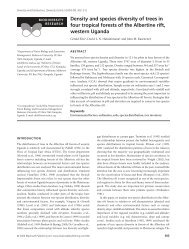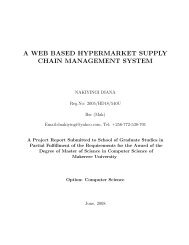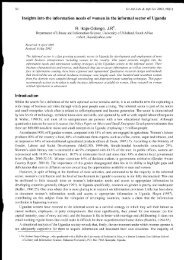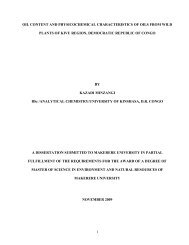THE UNIVERSITY OF LEIPZIG
THE UNIVERSITY OF LEIPZIG
THE UNIVERSITY OF LEIPZIG
Create successful ePaper yourself
Turn your PDF publications into a flip-book with our unique Google optimized e-Paper software.
with one of the Tirirki elders, the study learnt that due to the strict local ecological knowledge<br />
programme in the area, the behaviour of the local people in these localities is different. 661<br />
Parallel to the above, throughout the entire period of fieldwork, one could not fail to observe<br />
the negative perception that the local population had towards both the national laws and the<br />
formal enforcement mechanisms. Up to 78% of the respondents depicted that they had no<br />
knowledge of the national laws regarding access to forestry biodiversity resources, but knew<br />
about the forest wardens. The answer to this was attained by asking local respondents whether<br />
they had particular knowledge of laws that govern access to forestry resources in Kakamega.<br />
It was also evident that there was an open acrimony between the local population and the<br />
forest wardens. Many respondents interviewed by the study expressed a clear grasp of the<br />
penalties that would befall them if the forest wardens got hold of them. It was also interesting<br />
to find out that the majority of respondents admitted that acts such as charcoal burning,<br />
harvesting of plant species and tree cutting were illegal. Locals were also frequently heard<br />
remarking that they have problems with paying their debts and meeting other monetary<br />
obligations. Such arguments were used in the condemning of forest officials. The remarks<br />
used in the condemnation of the forestry officials were in form of social and economic justice.<br />
Both constructions represent a kind of moral condemnation, referring to norms concerning<br />
“right” and “wrong” methods of forest resource usage, ultimately leading us to issues of<br />
rational choice institutionalism and bio-ethics. However, we may argue that this is the<br />
ecological insight of the Kakamega locals and that is their way of constructing arguments<br />
representing a conflict of economic, social and to some extent cultural institutional interests.<br />
In evaluating the interface between local ecological knowledge and perceptions of national<br />
laws regarding the protection of forestry biodiversity, it can be summed that while scientific<br />
scholars view ecological knowledge in a rather neutral perspective, local people residing<br />
around the forest resource areas in Kakamega, are to a given extent involved in a world of<br />
conflicting institutional interests. It was also found out that varied sections of the local<br />
population viewed or perceived the formal resource regimes as very much in conflict with<br />
their economic and social interests. For instance, in the study we asked the respondents what<br />
their views were, as regards the national laws that are used in the management of national<br />
forestry biodiversity.<br />
The essence of the above question was to gauge local perceptions regarding the formal legal<br />
regimes that govern biodiversity in places around Kakamega forest. Up to 61.64% answered<br />
that they felt the national laws (laws enforced by forest wardens) were unfavorable to their<br />
cultural, social and economic interests. When further probed to find out whether the forestry<br />
authorities knew about these varied interests, 63% of the respondents said that the forestry<br />
authorities knew about their cultural and social and economic interests, while 36% informed<br />
the researcher that the forest authorities did not know about their varied interests.<br />
661 Field Interview No.6 15 July 2006.<br />
163






